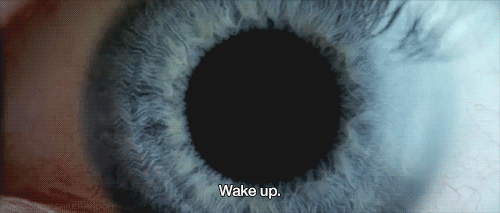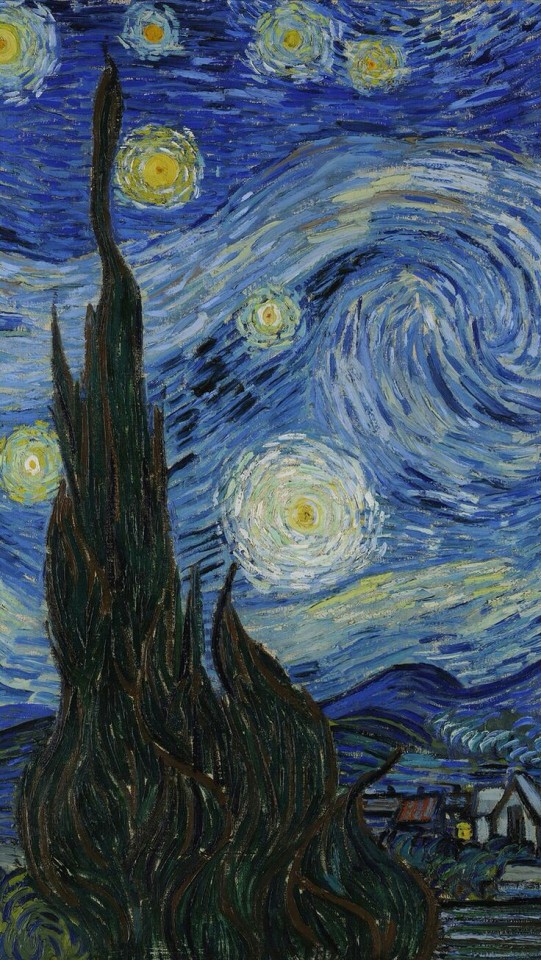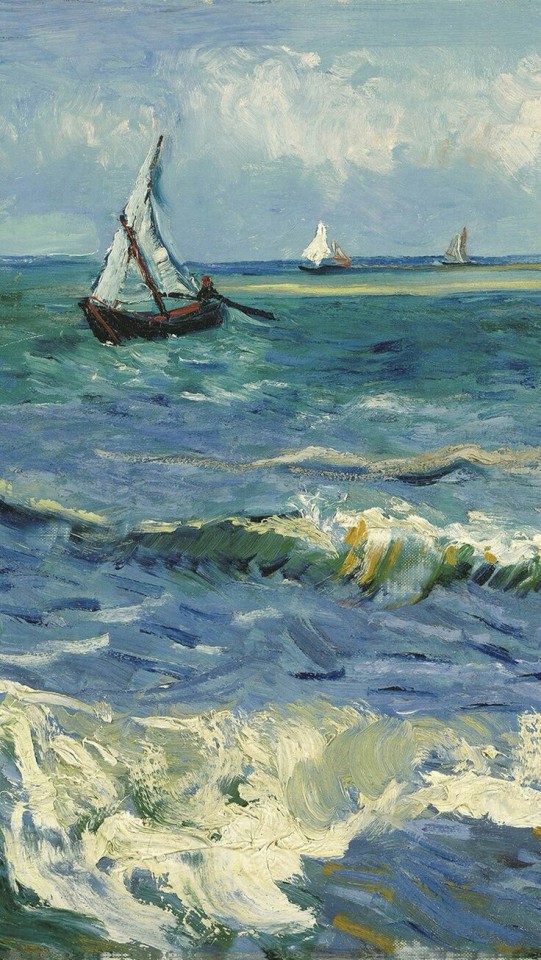Revesmecaniques - LOIN D'ICI

More Posts from Revesmecaniques and Others









•Painting wallpaper•


These, for me, are the two most depressing paintings in western history. They were painted by post-impressionist Henry de Toulouse-Lautrec, a man who, due to inbreeding, was born with a genetic disorder that prevented his legs from growing after they were broken. After being so thoroughly mocked for is appearance, he became an alcoholic, which is what eventually caused his institutionalization and death. His only known romantic relations were with prostitutes. And then he paints something like this which is so beautiful and tender and sentimental. It seems like the couple in bed really loves each other—cares about each other. Wakes up happy to look at each other. And I see that love and passion and I wonder how lonely he must have been. I wonder how he could paint something like this without it breaking his heart. Maybe they say artists should create what they know, not because its unbelievable when they extend themselves beyond their experiences, but because when they pull it off with such elegance, it’s so damn unbearable to look at. I hate thinking of Lautrec, wondering about the lovers he created and knowing it was beyond his experience. Creating something that he knows is beautiful and knows he’ll never really understand.
Stop it bitch! You're breaking my soul.






Jon J. Muth's watercolor illustrations
(previous)

It hurts to know that you belong here.
Poetry isn’t in the verses, sometimes it’s in the heart. And it is such, since words do not always fit.
Jorge Amado (via extramadness)

(by the air in the branches)
Our New Satellite to Study the Edge of Space
We’re about to launch a new satellite called ICON — the Ionospheric Connection Explorer — to study our planet’s boundary to space.

The overlap between Earth’s upper atmosphere and outer space is complicated and constantly changing. It’s made up of a mix of neutral gas (like the air we breathe) and charged particles, where negatively charged electrons have separated from positively charged ions. This charged particle soup reacts uniquely to the changing electric and magnetic fields in near-Earth space, while weather conditions from here on Earth can also travel upwards and influence this region. This makes Earth’s interface to space a dynamic, hard-to-predict region of the atmosphere.

Understanding what causes the changes in this region and how to predict them isn’t just a matter of curiosity. Earth’s boundary to space is home to many of our Earth-orbiting satellites, and it also plays a role in transmitting signals for communications and navigation systems. Unpredictable changes here can garble those signals and even shorten the lifetime of satellites.

ICON, launching on Nov. 7, will study this region with a unique combination of instruments. Orbiting about 360 miles above Earth, ICON will use its cameras to measure winds near the upper edge of Earth’s boundary to space and track atmospheric composition and temperature by studying a phenomenon called airglow. ICON also carries an instrument that will capture and measure the particles directly around the spacecraft, or in situ.

ICON is launching aboard a Northrop Grumman Pegasus XL rocket. On launch day, the Pegasus XL is carried out over the ocean by Northrop Grumman’s L-1011 Stargazer aircraft, which takes off from Cape Canaveral Air Force Station in Florida. About 50 miles off the coast of Florida, the Pegasus XL drops from the plane and free-falls for about five seconds before igniting and carrying ICON into low-Earth orbit.

NASA TV coverage of the launch starts at 2:45 a.m. EST on Nov. 7 at nasa.gov/live. You can also follow along with the mission on Twitter, Facebook or at nasa.gov/icon.
SOBRE LA INMANENCIA DE LA VIDA
Los seres humanos son capaces de conceptualizarse y pensar abstractamente de sí mismos, imaginarse en situaciones hipotéticas, imaginar realidades fuera de la propia existencia (la conciencia de la inevitabilidad de la muerte). Detrás de la construcción colectiva de conceptos que sugieren la inmortalidad (el cielo, el inferno, la reencarnaciòn etc), existe un miedo visceral a la extinción, a la desaparición completa del yo conceptual. Por qué son tan importantes los legados/proyectos de inmortalidad? No son esos deseos, una extensión del miedo a la inexistencia? Es ese miedo un producto mismo de la negación de la inmanencia misma de la vida?
-
 youfeelityet reblogged this · 2 months ago
youfeelityet reblogged this · 2 months ago -
 shake-your-money-maker liked this · 2 months ago
shake-your-money-maker liked this · 2 months ago -
 carol45374 liked this · 3 months ago
carol45374 liked this · 3 months ago -
 queuefehck reblogged this · 3 months ago
queuefehck reblogged this · 3 months ago -
 fehck liked this · 3 months ago
fehck liked this · 3 months ago -
 vampbie liked this · 4 months ago
vampbie liked this · 4 months ago -
 uhhfuckit liked this · 4 months ago
uhhfuckit liked this · 4 months ago -
 xxquispy-tarantulaxx reblogged this · 4 months ago
xxquispy-tarantulaxx reblogged this · 4 months ago -
 xxquispy-tarantulaxx liked this · 4 months ago
xxquispy-tarantulaxx liked this · 4 months ago -
 schizybun reblogged this · 4 months ago
schizybun reblogged this · 4 months ago -
 house-of-1000-corpses reblogged this · 4 months ago
house-of-1000-corpses reblogged this · 4 months ago -
 darksoulsworldz liked this · 5 months ago
darksoulsworldz liked this · 5 months ago -
 brzil reblogged this · 5 months ago
brzil reblogged this · 5 months ago -
 rizno liked this · 5 months ago
rizno liked this · 5 months ago -
 brzil liked this · 5 months ago
brzil liked this · 5 months ago -
 kawaiidesu reblogged this · 5 months ago
kawaiidesu reblogged this · 5 months ago -
 kawaiidesu liked this · 5 months ago
kawaiidesu liked this · 5 months ago -
 tomxo liked this · 6 months ago
tomxo liked this · 6 months ago -
 omgherbalicious reblogged this · 6 months ago
omgherbalicious reblogged this · 6 months ago -
 omgherbalicious liked this · 6 months ago
omgherbalicious liked this · 6 months ago -
 nakata-jf97 reblogged this · 6 months ago
nakata-jf97 reblogged this · 6 months ago -
 nakata-jf97 liked this · 6 months ago
nakata-jf97 liked this · 6 months ago -
 luminarianbeing liked this · 6 months ago
luminarianbeing liked this · 6 months ago -
 svndara reblogged this · 6 months ago
svndara reblogged this · 6 months ago -
 elatedghost reblogged this · 6 months ago
elatedghost reblogged this · 6 months ago -
 annita8942g8m51h liked this · 8 months ago
annita8942g8m51h liked this · 8 months ago -
 sd70mac liked this · 8 months ago
sd70mac liked this · 8 months ago -
 millenniumwalker liked this · 9 months ago
millenniumwalker liked this · 9 months ago -
 although27 liked this · 9 months ago
although27 liked this · 9 months ago -
 hypnoticreality reblogged this · 9 months ago
hypnoticreality reblogged this · 9 months ago -
 hypnoticreality liked this · 9 months ago
hypnoticreality liked this · 9 months ago -
 ayoashdgaf reblogged this · 10 months ago
ayoashdgaf reblogged this · 10 months ago -
 andioyama liked this · 10 months ago
andioyama liked this · 10 months ago -
 anxhelotosuni liked this · 10 months ago
anxhelotosuni liked this · 10 months ago -
 unbotheredgoldencutie reblogged this · 10 months ago
unbotheredgoldencutie reblogged this · 10 months ago -
 unbotheredgoldencutie liked this · 10 months ago
unbotheredgoldencutie liked this · 10 months ago -
 reallifeangel4 reblogged this · 10 months ago
reallifeangel4 reblogged this · 10 months ago -
 oldaccount7sblog liked this · 10 months ago
oldaccount7sblog liked this · 10 months ago -
 yathrib liked this · 10 months ago
yathrib liked this · 10 months ago
